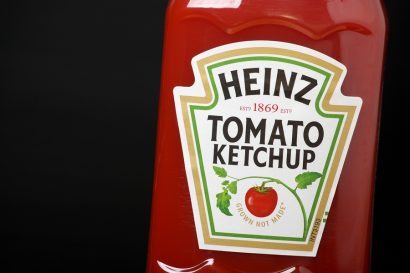
Israel bans Heinz Ketchup because itís linked to liver, pancreas, immune system, and brain issues
Erin Elizabeth
The food industry only allows it to be sold as “tomato seasoning”, not “tomato ketchup”. Triggered by a series of tests conducted by an Israeli food company also selling ketchup. The tests revealed that, although Heinz boasts over 60% tomato as an ingredient, there was only 21% tomato concentrate in each bottle.
Heinz Ketchup Ingredients
The Heinz parent company, Diplomat, tried to argue that their proportions of tomato concentrate were acceptable according to American and European ketchup standards. At that point, the Israeli health ministry got involved and insisted that Heinz must change their labels from “ketchup” to “tomato seasoning” if they want to continue selling their popular product in the country.
Low tomato content
Now, just a minute! Heinz just admitted that the standard for what’s called ketchup in the United States has only 21% tomato in it. And that’s tomato concentrate, not fresh tomatoes. Tomato paste (with no added salt) contains a significantly higher amount of sugar, sodium, and carbohydrates per serving than raw tomatoes.
The company’s website posts the nutritional information and ingredients of all of their products. For the ‘original’ variety of ketchup sold in the USA, there are 4 grams of sugar per 17 grams of ketchup. So, what’s the rest of ketchup made of? Vinegar, 2 different types of corn syrup (fructose), salt, and other undisclosed spices.
RELATED ARTICLES:
- The Case Against Sugar: New Book Reveals the Details of How the World Got Addicted to Sugar
- Why Cutting Down on Sugar Might Be the Best Health Insurance Available
High sugar
With high sugar comes higher health risks. High fructose corn syrup, as well as any other form of sugar in our food, can contribute to:
- unhealthy weight gain
- type 2 diabetes
- high blood pressure
- extra belly fat
- heart disease
- fatty liver disease
- pancreatic cancer
- reduced immune strength
Of course, consuming reasonable amounts of natural sugar found in whole foods probably won’t increase your risk of heart disease, but it’s easy to lose track of added sugar in your diet. The American Heart Association recommends limiting added sugar to only 100 calories a day for women and 150 calories a day for men to encourage heart health.
RELATED ARTICLE:
Make Your Own Ketchup!
Luckily, making your own (real) ketchup is easier than many people think. This recipe skips the tomato paste and uses fresh crushed tomatoes instead, allowing you to cut down sugar levels. This recipe also features apple cider vinegar and coconut sugar, which provide great benefits that Heinz’ brand ketchup cannot. Coconut sugar keeps many of the nutrients of the plant it’s derived from, including iron, zinc, calcium, potassium, and antioxidants. Apple cider vinegar has great anti-bacterial properties and helps you feel full after you eat. There are many reasons to incorporate these two ingredients in your cooking:
- Treat cold and flu
- Soothe upset stomach
- Help lose weight
- Fight free radicals
- Promote healthy skin, hair, and nails
- Help manage anemia
- Promote bone health
- Reduce risk of stroke
- Help treat high blood pressure
Real Homemade Ketchup
We recommend using a slow cooker for easiest and safest preparation. Keep your Real Homemade Ketchup in the fridge, and use at barbecues, on French fries, and as a healthy part of your favorite meals.
What You Need:
- 4 cups peeled, crushed tomato
- ½ cup water
- 2/3 cup coconut sugar
- ¾ cup apple cider vinegar
- 1 tsp onion powder
- ½ tsp garlic powder
- 1 ¾ tsp salt
- 1/8 tsp celery salt
- 1/8 tsp mustard powder
- ¼ tsp ground pepper
- 1 garlic clove
What to Do:
- Combine all ingredients into a large slow cooker.
- Cook on high heat without covering until it thickens, stirring occasionally (about 10 hours) .
- Blend with a hand blender until smooth (about 30 seconds).
- Strain ketchup through a fine strainer into a sealable container to remove any seeds.
- Once completely cool, you can add extra spice to taste.
OR- follow this recipe:
SEE VIDEO:

